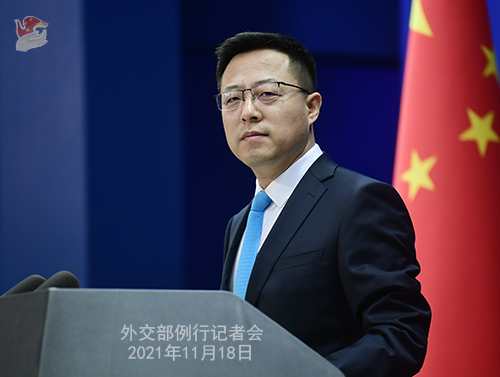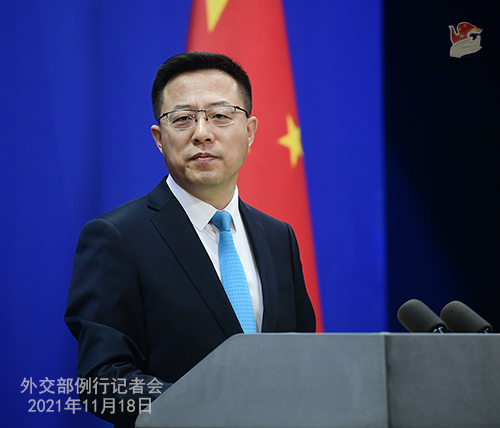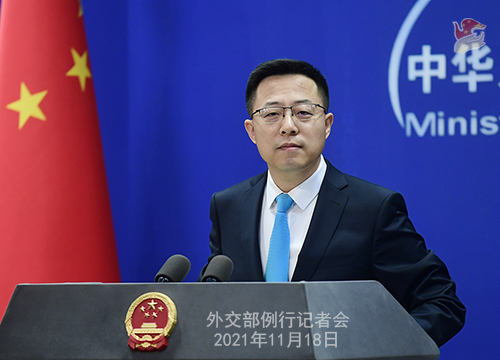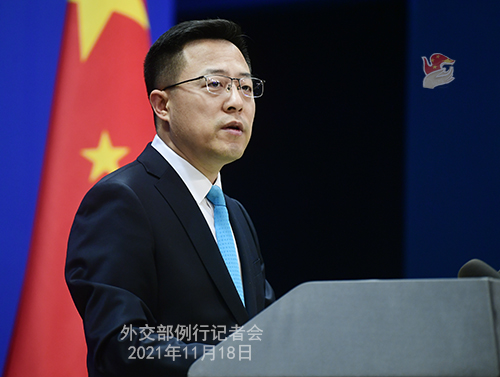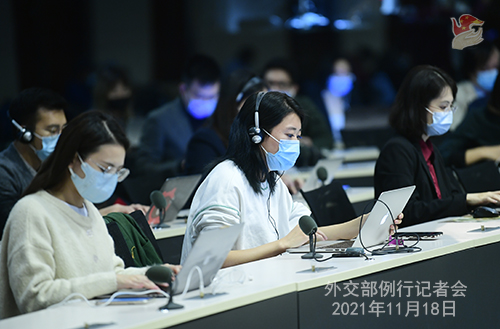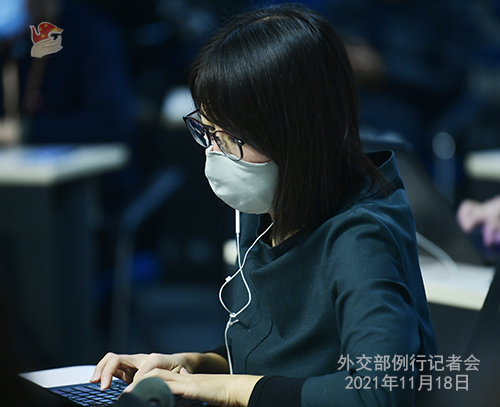| Foreign Ministry Spokesperson Zhao Lijian's Regular Press Conference on November 18, 2021 |
|
|
| 2021-11-18 21:20 |
|
Xinhua News Agency: It is reported that Premier Li Keqiang recently attended the World Economic Forum Special Virtual Dialogue with Global Business Leaders. Can you brief us on the meeting and its outcomes? Zhao Lijian: On the evening of November 16, Premier Li Keqiang attended the World Economic Forum Special Virtual Dialogue with Global Business Leaders, delivered remarks and had interactions and exchanges with business leaders. Chairman of the World Economic Forum (WEF) Klaus Schwab chaired the dialogue, and nearly 400 entrepreneurs from more than 40 countries attended the event. In his remarks, Premier Li stressed that the world is still seeing the flare-ups of the pandemic, weak global economic recovery and increasing uncertainties and destabilizing factors. China stands ready to work with all parties to fight COVID-19, promote economic recovery and keep industrial and supply chains stable and unimpeded. We will firmly uphold the basic norms governing international relations based on the UN Charter, safeguard the WTO-centered multilateral trading system, and enhance trade and investment liberalization and facilitation. We should strengthen macro policy coordination, maintain global financial stability and promote steady recovery of the world economy. Premier Li Keqiang talked about China’s current economic situation, pointing out that China is advancing epidemic control and economic and social development in a coordinated way, and the economy overall has continued to recover. In the meantime, we do face some new downward pressure, but the fundamentals of China's long-term economic growth have not changed. Following the requirement of basing ourselves on the new development stage, applying the new development philosophy, fostering a new development paradigm and pursuing high-quality development, we will strengthen cross-cyclical adjustments to ensure that the economy operates within proper range and stays on a steady course. We will unswervingly open wider to the world, promote international cooperation in various fields and at various levels, foster a world-class, market-oriented business environment governed by a sound legal framework, treat all market entities as equals, and protect intellectual property rights in accordance with the law. Premier Li Keqiang commended foreign enterprises' support for China's reform and opening-up as well as modernization, stressing that as long as we enhance confidence, face up to difficulties, and uphold openness, inclusiveness, solidarity and cooperation, we will create a bright future for world economic development. Premier Li also answered questions from business representatives of various countries on energy supply, green development, medical and health care, urbanization and other issues. MASTV: German Chancellor Angela Merkel now acting in a caretaker capacity said it would be wrong to completely decouple from China and that it would hurt Germany and Europe. She advised the new government and the European Union to continue to work with China. Do you have any response? Separately, according to a Bloomberg report, China is accelerating plans to replace American and foreign technology, quietly empowering the Information Technology Application Innovation Working Committee to vet and approve local suppliers in sensitive areas from cloud to semiconductors, so as to draw up a white-list. The Committee has now been entrusted by the Chinese government to help set industry standards and train personnel to operate trusted software. Do you have any comment? Zhao Lijian: On your first question, Chancellor Merkel attaches importance to developing relations with China. She visited China for 12 times during her term, and helped to deepen and substantiate practical cooperation and friendly interactions in various areas with China, which has brought tangible benefits to the two countries and the two peoples. China highly appreciates this. In the meantime, China always believes that mutual respect, equal treatment, exchanges and mutual learning, and win-win cooperation should be the mainstream in a globalized world. On your second question, the Bloomberg article is pure disinformation. China is not formulating any plan to replace American and foreign technology or authorizing the Information Technology Application Innovation Working Committee to vet local suppliers to draw up a white-list. China is committed to opening up to the world. We welcome more foreign companies to provide technology, products and services that meet China’s requirements. Our consistent position of supporting economic globalization and fostering an open world economy has not changed and will never change.
CCTV: According to reports, the seventh batch of COVID-19 vaccine assistance provided by China to Cambodia arrived on November 17. Cambodian Prime Minister Hun Sen and Deputy Prime Minister and Minister of National Defense Tea Banh received the vaccines at the airport. Could you share more information on China-Cambodia vaccine cooperation? Zhao Lijian: China and Cambodia are close neighbors and iron-clad friends. Since COVID-19 started, the two sides have been working together to overcome the difficulties with mutual assistance. After its self-developed vaccine was given conditional approval for general public use, China provided doses first to Cambodia and overcame difficulties to guarantee supply, demonstrating the strength of our community with a shared future. We are glad to see that under Prime Minister Hun Sen’s strong leadership, Cambodia has completed its phase-one vaccine rollout ahead of schedule, brought the epidemic under effective control at home, and resumed socioeconomic development in an orderly fashion. China stands ready to continue providing vaccine support and anti-epidemic supplies assistance to Cambodia based on its needs. CNR: We noticed that a video conference commemorating the 80th anniversary of the arrival of Flying Tigers in China for the war of resistance was held in Beijing the other day. Can you talk about the relevance of the commemoration under current circumstances? Zhao Lijian: On November 16, the Chinese People's Association for Friendship with Foreign Countries (CPAFFC) hosted a video conference in Beijing commemorating the 80th anniversary of the arrival of Flying Tigers in China for the war of resistance. Zheng Jianbang, Vice Chairman of the Chinese People's Political Consultative Conference (CPPCC) National Committee attended the event and delivered a keynote speech. Qin Gang, Chinese Ambassador to the US, delivered remarks via video link. CPAFFC President Lin Songtian, family members of General Claire Lee Chennault, representatives of Flying Tigers veterans, and heads of organizations including the Sino-American Aviation Heritage Foundation, the Flying Tiger Historical Organization and the US Sino Friendship Association all delivered remarks at the event. Around 200 people from various sectors in China and the US attended the conference online. The story of the Flying Tigers carries with it the deep bond of friendship forged with the ultimate sacrifice by the Chinese and American people. Over the past eight decades, the story has been passed down from generation to generation and remains as relevant today as ever. Our two countries should carry forward this bond of friendship, enhance mutual understanding and pursue peaceful co-existence and win-win cooperation on the basis of mutual respect. Just as President Xi said during the virtual meeting with President Biden, as the world’s two largest economies and permanent members of the UN Security Council, China and the US need to increase communication and cooperation, each run their domestic affairs well and, at the same time, shoulder their share of international responsibilities, and work together to advance the noble cause of world peace and development. China and the US need to work together with the rest of the international community to jointly address global challenges, promote global development, and safeguard a fair and equitable international order. That encapsulates the relevance of our commemoration and inheritance of the Flying Tigers spirit today. The Chinese side stands ready to work with the US to implement the spirit of our two heads of state’s virtual meeting, maintain dialogue and communication, strengthen exchange and cooperation, and advance exchanges at various levels and across all sectors to inject more positive energy into bilateral ties and promote the sound and steady development of our relations.
Bloomberg: The Philippines’ Foreign Affairs Secretary said that three Chinese coast guard vessels blocked and water cannoned two Philippine boats en route to supply food to soldiers in a military outpost in the South China Sea. Could the foreign ministry comment on that? Zhao Lijian: On the evening of November 16, two Philippine supply boats trespassed into waters near Ren'ai Jiao of China's Nansha Qundao without China's consent. Chinese coast guard vessels performed official duties in accordance with law and upheld China's territorial sovereignty and maritime order. At present, the sea area of Ren'ai Jiao is generally tranquil. China and the Philippines are in communication on this. The Paper: Yesterday the People’s Government of the Xinjiang Uyghur Autonomous Region held the 60th press conference on Xinjiang-related issues in Beijing and shared the region’s experience in counter-terrorism and deradicalization. Do you have any comment? Zhao Lijian: At this press conference on Xinjiang-related issues, the spokesperson of the regional government shared seven key takeaways from Xinjiang’s counter-terrorism and deradicalization experience. First, follow international principles on counter-terrorism. Second, uphold rule of law in theory and practice. Third, protect human rights in fighting terrorism. Fourth, avoid associating counter-terrorism and deradicalization efforts with any particular region, ethnicity or religion. Fifth, uphold justice through severity tempered with clemency and bring back those who have gone astray by preventive education. Sixth, sustain and improve people’s livelihood. Seventh, take part in practical international counter-terrorism cooperation. The seven takeaways crystallize the hard work and wisdom of the officials and people of all ethnic groups in Xinjiang in fighting violent terrorist crimes and protecting people’s safety and property. They also underpin Xinjiang’s stability, flourishing economy and improving living standards. At the press conference, some victims of violent terrorist attacks in Xinjiang and their families shared their stories, saying they abhor the threat posed by terrorism and the crimes carried out by terrorists and hope what happened to them would never be repeated. I want to stress that Xinjiang-related issues are in essence about countering violent terrorism, radicalization and separatism, not about human rights or religion. In the face of the grave and complex counter-terrorism situation, Xinjiang has taken a host of decisive, robust and effective deradicalization measures. As a result, Xinjiang has seen no violent terrorist case for five years in a row. The region now enjoys social stability and harmony, as well as economic development and prosperity. The local people are living a safe, happy and fulfilling life. These facts can best reflect the human rights situation in Xinjiang as it is and speak volumes about the effectiveness of China’s Xinjiang policy. They are the most powerful response to all sorts of lies and disinformation on Xinjiang. With the concerted efforts of people of all ethnic groups in Xinjiang, we believe that the region will embrace an even brighter future. Hubei Media Group: On November 12, the US Department of the Treasury designated four entities and two individuals including the Eritrean Defense Force, the People’s Front for Democracy and Justice, and Hagos Ghebrehiwet W Kidan, who is economic advisor to the Eritrean President, pursuant to an Executive Order President Biden signed on September 17. Does the Chinese side have any comment? Zhao Lijian: China consistently holds that international law and basic norms governing international relations should be complied with as countries interact with each other. We oppose interference in other countries’ domestic affairs with the use or threat of unilateral sanctions. Past experience has shown that the unilateral sanctions imposed by certain countries failed to produce any constructive effect on regional peace and stability. On the contrary, they often had a devastating impact on the economy and livelihood of the affected countries and were unanimously rejected by the international community. China hopes that the parties concerned will prudently handle relevant issues and play a constructive role in maintaining peace and stability in the Horn of Africa.
China Review News: Anne Neuberger, Deputy Assistant to the US President and Deputy National Security Advisor for Cyber and Emerging Technology on the National Security Council, who is in Japan for a visit, said on November 17 that “under the Taiwan Relations Act, we ensure that Taiwan can maintain sufficient self-defense, including in cyber”. She also expressed concerns over the cyber attack launched by China’s mainland and others that may undermine cross-Strait relations. Do you have any comment? Zhao Lijian: The so-called “Taiwan Relations Act” cited by the US side gravely violates the one-China principle and the three China-US Joint Communiqués and essentially places domestic law above international obligations. It is illegal, null and void. On the Taiwan question, the US should abide by the one-China principle and the three China-US Joint Communiqués, rather than something it unilaterally concocted. What truly undermines cross-Strait relations is “Taiwan independence” separatist activities and external interference. China consistently opposes and cracks down on all forms of cyber attacks. As is well-known, the US is the notorious “empire of hacking”. The US should stop playing the trick of the thief crying “stop the thief”, and stop instigating cross-Strait confrontation, to avoid severely harming China-US relations and peace and stability across the Taiwan Strait. Bloomberg: A report from the US-China Economic and Security Review Commission said that the US should bolster its ability to deter a Chinese attack against Taiwan and strengthen oversight of Chinese companies. Does the foreign ministry have any comment on the report? In addition, White House officials said the US is seeking ways to discuss issues of strategic stability with China as concerns in Washington mount over Beijing’s growing nuclear arsenal. Does the foreign ministry have any comment on that? Zhao Lijian: On your first question, this commission you mentioned concocts the so-called report on China year after year, which interferes in China’s domestic affairs and undermines China-US relations. The report, awash with disinformation and malicious slander, mirrors the commission’s persistent ignorance and entrenched bias against China. The relevant US institution should reject the Cold-War zero-sum mentality and ideological bias, follow the trend of the times and the aspiration of people of the world, plant more flowers and fewer thorns, do more things conducive to promoting mutual trust and cooperation between our two countries instead of the opposite. On your second question, I noted the clarification made by the US side on this. Associated Press of Pakistan: As per reports, an Indonesian diplomat based in Pakistan has recently said that ASEAN can connect with global networks like the China-Pakistan Economic Corridor and the Belt and Road Initiative. What is your response? Zhao Lijian: We appreciate the remarks made by the Indonesian official. China is ready to work with other parties to continue to advance high-quality BRI cooperation and form synergy between regional development plans so as to inject impetus into economic recovery and sustainable development in the region and beyond.
NHK: Taiwan held a ceremony this morning to commission the first squadron of F-16V fighters. The ceremony was chaired by Tsai Ing-wen and attended by the Director of the American Institute in Taiwan (AIT). Do you have any comment? Zhao Lijian: China's position on the Taiwan question and US-Taiwan relations is consistent and clear-cut. China opposes any official contact between the US and Taiwan. We hope that the US side will earnestly abide by the one-China principle and the stipulations of three China-US Joint Communiqués, speak and act with prudence on the Taiwan question and refrain from sending any wrong signal to the “Taiwan independence” separatist forces. The crux of the tensions across the Taiwan Strait is that the “Taiwan independence” separatist forces spare no effort to split the motherland and collude with external forces. What they do is just like an egg knocking itself against a stone and an ant trying to shake a huge tree, which is doomed to fail. Bloomberg: The US and Japan announced the formation of a new trade partnership to strengthen their alliance and coordinate on third country concerns. And the second question is China's ambassador to the EU has said some businesses see the EU creating new trade barriers through discriminatory practices. It is reported today that China's Hisense Group is reported to be considering a $1 billion bid for a unit of Siemens. What does China want to see if Hisense does indeed make a bid? Zhao Lijian: On your first question, how the US and Japan grow their economic and trade ties is their own affairs. The most basic principle to follow when countries conduct cooperation is that they should not target or undermine the interests of any third party. On your second question, the Chinese Ambassador to the EU already expounded on China’s position. Relevant measures of the European side violate the spirit of the WTO and the market principle of fairness and justice. They have added to the uncertainties that are experienced by foreign businesses, including Chinese companies, in their operation in Europe. Such measures have increased the difficulties and burden of enterprises. They are not conducive at all to maintaining the stability of global supply and industrial chains or promoting economic recovery in the post-COVID era. The European side should earnestly abide by basic principles of the WTO, remove the disturbances of protectionism, and advance trade and investment liberalization and facilitation. With regard to the specific situation about the cooperation, I would like to refer you to competent authorities in China and relevant companies. China Daily: US Secretary of State Antony Blinken issued a statement on November 17, designating Russia, China and other eight countries as Countries of Particular Concern for violating religious freedom. Do you have any response? Zhao Lijian: China firmly opposes the groundless accusation and smearing against China's religious freedom by the US side. The Chinese government protects citizens' freedom of religious belief in accordance with law. In China, there are nearly 200 million religious believers, over 380,000 clerical personnel, about 5,500 religious groups and over 140,000 places of worship registered for religious activities. People of all ethnic groups in China fully enjoys the freedom of religious belief. Facts speak louder than words, and a lie repeated a thousand times does not become truth. The spread of Islamophobia and other extremist ideologies in the US has caused a lot of tragedies. Instead of reflecting on itself, the US has frequently used religious issues to interfere in other countries' internal affairs in disregard of facts. The US side should face up to its own problems, manage its own affairs well, respect facts, set aside prejudice and stop using religious issues to interfere and smear other countries.
|
| ||||||||||
|
||||||||||
|
|
